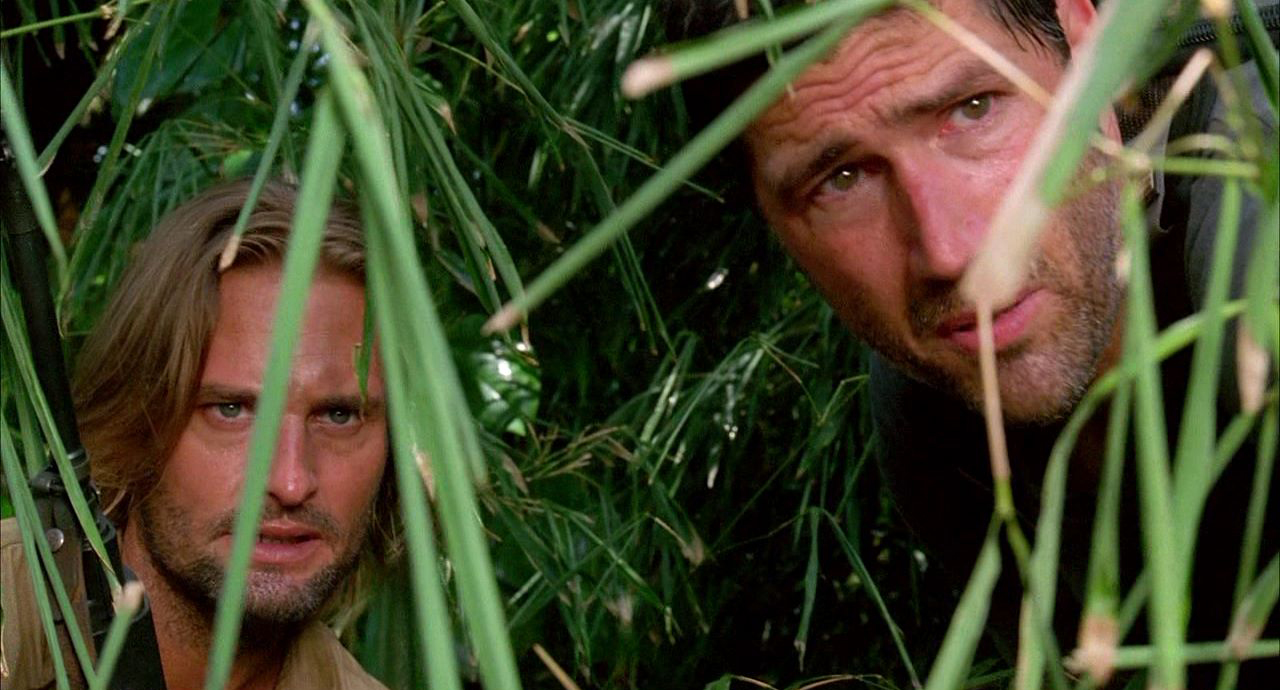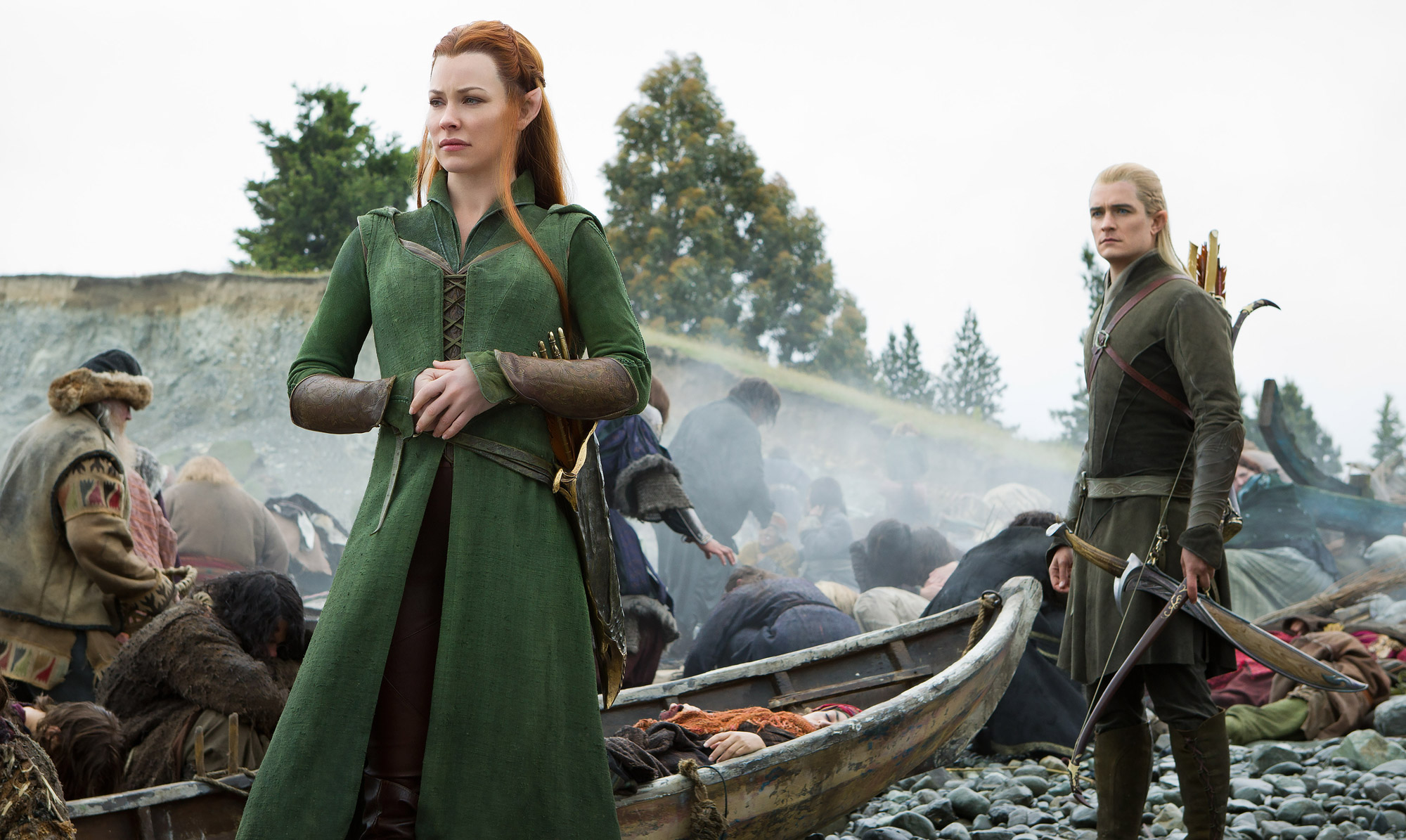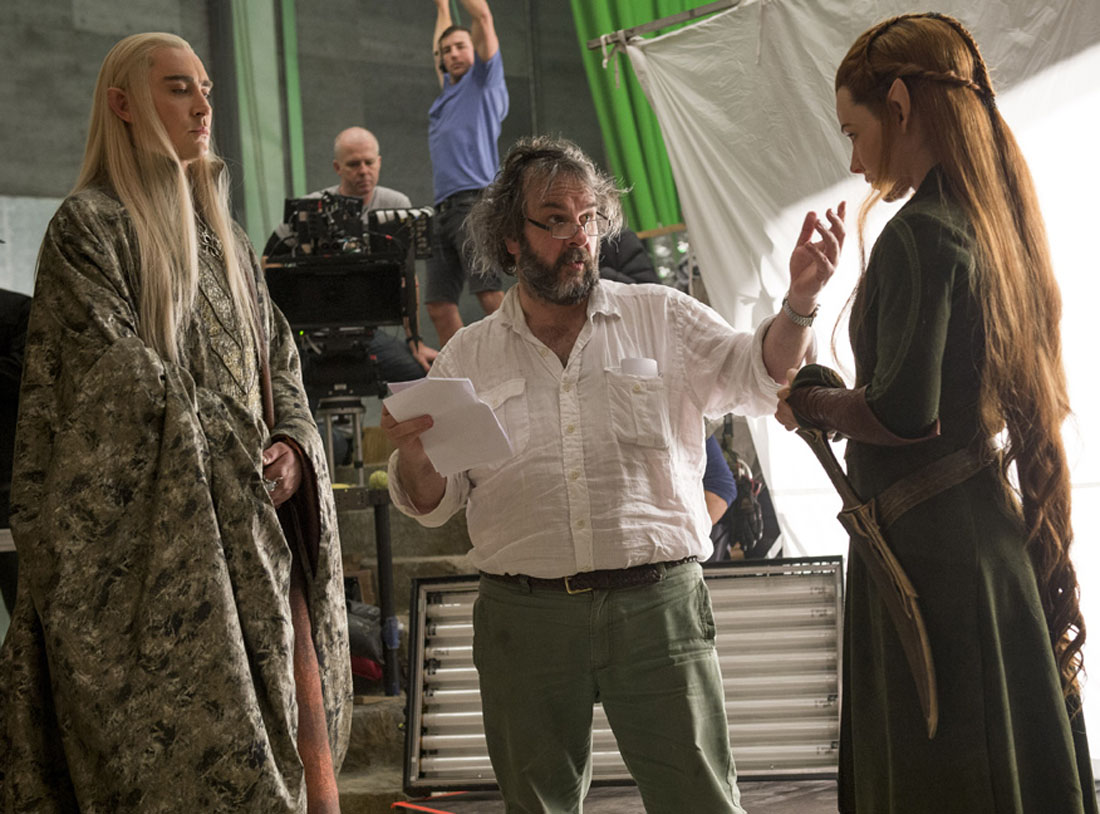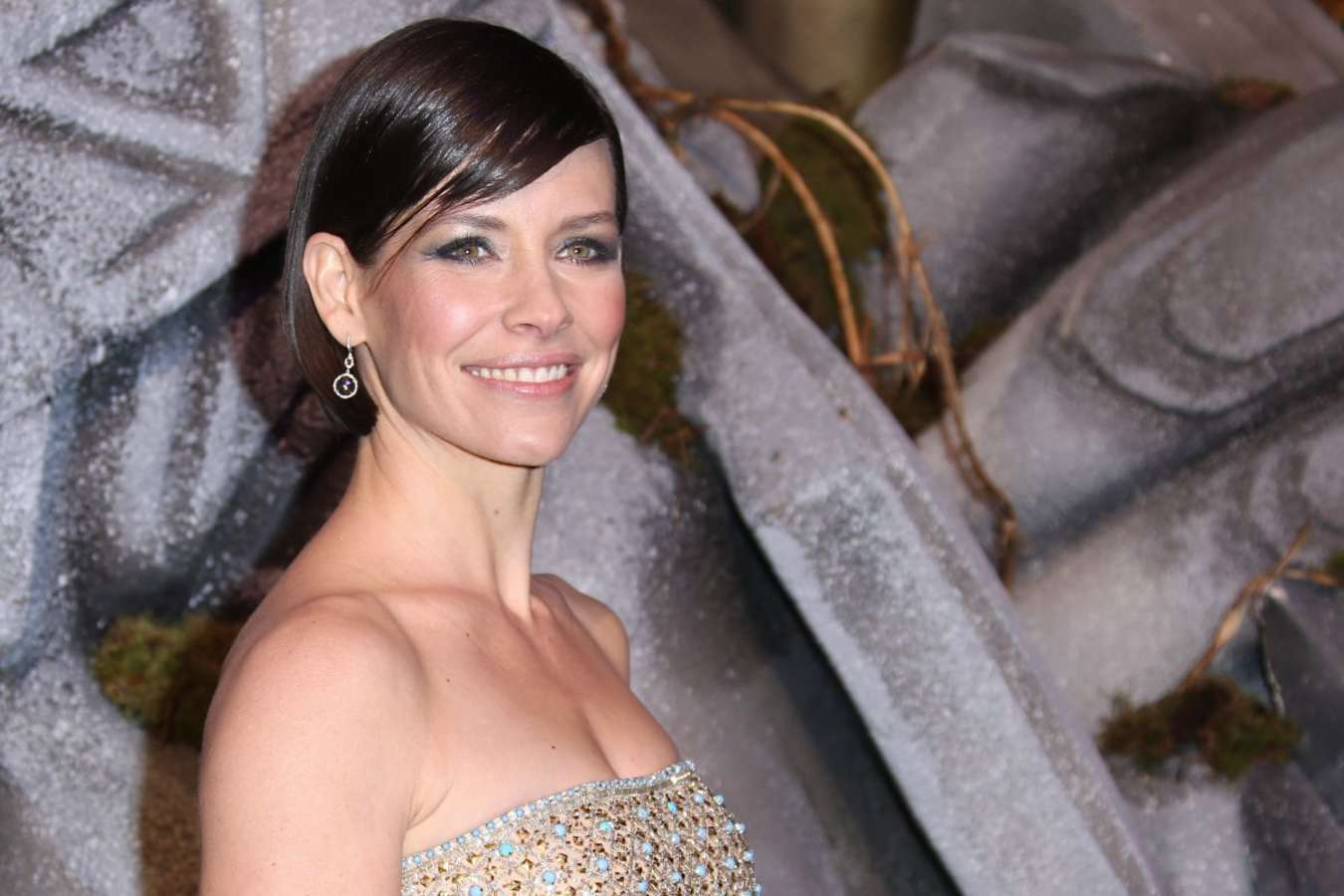Interview: ‘The Hobbit’ star Evangeline Lilly

Among the many additions Peter Jackson and Fran Walsh made to The Hobbit for its expansion into a trilogy of films was the Elf character Tauriel. Played by Evangeline Lilly, Tauriel brings an arguably necessary female presence to what would otherwise be a dude-fest of epic proportions. Flicks’ Dominic Corry sat down with Lost-alum Lilly on the set of The Battle of the Five Armies to talk about her role, the experience of making these films, and to get Lilly’s take on the role of women on and off-screen in Hollywood.
FLICKS: How intimidating was it coming into a franchise with such intense fans?
EVANGELINE LILLY: Not intimidating at all, because I spent six years on the television show Lost. And they’re equally as intense. And, so far in my experience, more intense. That is a challenge to the Ringers. Um, and so I feel really right at home with that kind of fan base.
Is it stressful dealing with this level of fandom?
It was for about the first two years of Lost. And then I started to learn how to navigate it a little bit better. And I actually said to somebody recently, I wish I could have gone into Lost with the experience and the knowledge that I have now going into this film. Because I know how to prepare myself, I know what to expect. It’s much less intimidating. And I think it gives me more freedom to be able to embrace it a little bit more, whereas with Lost, I was so overwhelmed by the entire thing that I rejected it completely. I had zero interest in being in the spotlight or having fan attention. And now, I certainly don’t want to seek it out, I’ll maintain my privacy as much as possible, but I think it scares me a lot less now. And I just know what to expect, which is nice.
How involved were you in creating Tauriel’s look?
I was involved from the very, very, very beginning in creating Tauriel, from her personality to her look to her relationships, and finding the nuances and just the right place for those. And I have to say, her hair was originally quite a bit closer to brown. It was auburn. And I begged for brilliant red hair. I begged for it to be bright red. And we got somewhere in the middle.

What are those dots on your hand for?
These are from today’s work. I was on the horse and I was riding behind Legolas, or Orlando Bloom, and I was shooting a bow and arrow. But of course, you may have noticed if you were in the room is that I actually don’t draw any arrows because it would be way too sloppy. It’s much tidier to do it in post. So I pretend to draw an arrow and I pretend to shoot it. Well, because they have to put that arrow into the bow eventually in post, they want to be able to track my motions as best as possible. So these are tracking marks so that when my fist is out front, at the front of the bow, they can follow my hand and its angles and its nuances much more easily than if it was just a blob of skin colour.
How challenging is it to act with so many elements adding after shooting?
It’s the most challenging job I’ve ever had as an actor, because the technicality of it almost overwhelms your ability to be natural and to feel and to emote. Often it’s a little bit of a game of which one are you going to make important today. And for some scenes, I have to let go of all the technicality of being an Elf and how to do my stunts and how do you speak with a proper accent speaking Elvish, let go of thinking of those things and just let the emotion flow. And if there’s mistakes or there’s things that look wrong, just hope that people are captivated by the performance and they won’t notice. But then there’s other times where you go, “You know what? The performance is actually slave to the technicality now, in this moment.” And that horse shooting is one of those perfect examples where it’s more important that I focus on getting it technically correct than acting that I’m angry and I’m killing. That’s so much less important at that time than making sure the movements are right, that the shots are accurate.

The cast often speak of how much the set is a family. Did Peter and Fran go out of their way to make you feel part of that family when you first came on board?
Peter and Fran, and Philippa, who I would say is the ambassador of the trio. She’s the one who opens her doors and opens her arms and does a lot of the PR, because of course Pete and Fran are very, very busy people. But they are the most open, the warmest, the most inviting team that I’ve ever worked with. And um, I think they’re the only directors who have ever had me over to their house. They’re the only writers who have ever sat me down and said, “Here’s what we’re thinking of writing. What do you think? Do you like it? Do you want to change something? Are you happy?” So it’s a really unique experience, and I think it’s a very Kiwi experience.
What’s the funnest and hardest part of playing this role?
The funnest part is definitely being a kick-ass elf. That’s really fun. And the hardest part for me is acting in an accent because it does take a certain amount of intellectual concentration. Let me rewind. If I had those lines for a month, it wouldn’t. But I usually have them for a night. So when I arrive the next day, I’m still thinking very hard about how to pronounce those words. As they’re going, “Okay, roll camera,” I’m not sort of getting into character. I’m thinking, “Not, not, not, not, not,” so that it comes out as “not,” and not “nawt.” So that is probably the hardest part for me.
Was it amusing to you to be involved in yet another love triangle after ‘Lost’?
I would say that the Sawyer is probably Kili and the Jack is probably Legolas.

How would you describe Peter Jackson as a director?
He is a wonderful director to work with for me because I will respond so much better if somebody’s just having a lark, you know, if we’re just having fun. We’re all having a laugh, we’re making movies, we’re not curing cancer. I like to come in and play. I think we’re playing house all day. That’s how I view my job. But when I’m with a director who takes it very, very seriously, I just clam up. I just shut down. I feel myself go, “Oh, God.” The pressure that puts on me as a performer makes me lose the ease and the playfulness of what we’re doing. So Peter, I mean Peter’s just cracking jokes all day, he’s always got food on his shirt from lunch, he’s just got crazy wiry hair, a cup of tea, he’s laughing, and he always does these hilarious line readings like where he’ll go, “What if you tried it like this?” And then he puts on his Elf face, or he puts on his Dwarf face, or he puts on his goblin face and he just does it, and he looks hilarious, especially when he tries to be an Elf. Imagine Peter Jackson trying to be an Elf. And it’s great because he’s so self-deprecating. He can laugh at himself, he just is really having fun on set, and for me, that’s the best environment I can work in.
Apart from Peter, who have you enjoyed working with in this production the most?
It might sound like a pat answer, but genuinely, it’s Fran Walsh. She is the unsung hero, I think, of these movies, and she’s a very shy person who stays out of the spotlight. And I think Peter very bravely takes care of that for her because he loves her and he wants to protect her from too much exposure. But getting to know her has been a complete surprise because she embodies what I believe is ultimately feminine power. I don’t think that a character like Tauriel in any way, shape or form is embodying feminine power. I think she embodies masculine power. And I think that women in film who go and shoot people up and beat people up are not representing feminine power. Even though they’re sort of the icons of the feminist movement, they represent a woman trying to act like a man. And I don’t think that that’s meaningful. For me. It’s not meaningful for me.
But when I watch a woman like Fran Walsh who is incredibly compassionate to the point that she hears about anyone else’s hurts, anyone else’s fears, anyone else’s pains, and her eyes will well up. She will feel what they’re feeling, she will connect to them, and she will immediately want to reach out to help them. She also is an incredibly intelligent thinker and writer and can break down story and create the incredible films that you’ve seen. And all of the things that make her soft and make her vulnerable, I think, are what make her powerful. And I look at her and I go, “I wish there were more female characters like this in film,” and people would look to them and say, “That is embodying female power.” That the female power takes on a very different shape than male power. But I think because mostly it’s men writing the stories, we don’t get the real deal.
Do you think she signifies an increasing presence of women in power positions in Hollywood?
I think that it’s, it’s changing. I think not quite yet. It’s like if it was a slingshot. Right now the stone has finally been pulled back but it hasn’t been let go yet. And I think that’s just a generational thing. I think that there’s still a vestige of old Hollywood men who aren’t quite ready for that revolution to happen. But I do believe that the young Hollywood men, from the directors and the producers to the actors and writers, everybody that is in the younger age brackets absolutely, wholeheartedly want the industry to move in that direction. They encourage it, they’re looking for good female producers and writers and directors and hoping to find them. And I think they’re out there and they will be mined and they will surface and I hope to be one of them. And I think that once it starts to happen, once that motion actually starts to take foot, which I guess Kathryn Bigelow winning the Oscar for The Hurt Locker was maybe the beginning of that, that stone will be released. And once it is, “Look out, world.”
The Hobbit: The Battle of the Five Armies is playing now in 3D High Frame Rate, 3D and 2D.



















